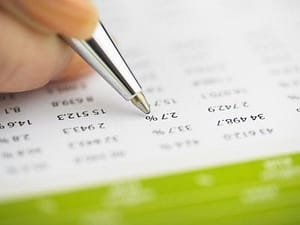MBTI® Test ISFP Bill and Account Collectors
Strong Interest Inventory® General Occupational Theme Code: Conventional, Enterprising (CE) (GOT)
A career as a bill and account collector requires a certain level of compassion and drive, as well as a big-picture mindset of the world around them. Introverted-Sensing-Feeling-Perceiving (ISFP) types—taken from the Myers-Briggs® Type Indicator (Myers-Briggs test) assessment—possess these inherent qualities. MBTI test ISFP types are often content in, and a good fit in, careers as bill and account collectors.

Image courtesy of adamr at FreeDigitalPhotos.net
Bill and account collectors are in charge of making sure that a company’s clients and customers are paying their balances on time. They are also imperative in notifying the client or customer of a bill that is due, overdue, or delinquent, whether by mail, verbally over the phone, or by paying them a visit. Bill and account collectors are involved from the beginning, as soon as the bill is written up, to describe the goods or services that the client or customer is required to pay for. From there, they receive and process the payment; prepare the necessary statements if a bill should go unpaid for a certain amount of time; and keep detailed records of the client or customer’s credit and payment history. Occasionally, bill and account collectors will also give advice on how to recover from debt (or how to best pay it off), and then arrange the necessary steps for the client and customer to follow.
Excelling in this occupation requires a certain degree of finesse, as clients and customers will often dread contact with you. For this reason, a substantial level of customer service knowledge is important to this career, as is a thorough knowledge of the current financial laws and court procedures surrounding unpaid debts. Persuasion and negotiation skills are also helpful for bill and account collectors, especially when trying to coerce someone into paying an overdue bill. Critical judgment skills will further help those in this occupation, as they will have to make tough decisions about what actions to take, against or for someone else.
Account collectors often use a range of different tools and technologies, including autodialers, all kinds of computers (e.g., smart phones, tablets, laptops, notebooks, etc.). In addition, they use software for a variety of purposes, including keeping accurate accounting records, maintaining strong and accurate relationships with their clients, and organizing and retrieving large amounts of information quickly and conveniently.
-
MBTI® Career Report
Price: $62.50 Buy NowFind your best occupational match with this ten-page Myers-Briggs Type Indicator Career Report
Choosing a career path can be difficult. The revised MBTI® Career Report helps point the way by showing you how your type affects your career exploration and discusses the benefits of choosing a job that is a good fit for your type. You will explore preferred work tasks and work environments as well as your most popular and least popular occupations and receive strategies for improving job satisfaction. This completely updated report includes expanded coverage of popular fields such as business, health care, computer technology, and high-level executive and management occupations. It is based on your four-letter MBTI Personality Type, which is additionally explained within The Career Report.
Most bill and account collectors hold at least a high school diploma, though some do have an associate’s degree. However, most importantly, they need to be able to learn on the job and continue to build new skills within their work environment.
Below are some employment trends for Bill and Account Collectors:
- Median wage: $17.79 hourly, $37,000 annually
- Employment: 258,000 employees
- Projected growth (2018-2028): Decline (-2% or lower)
- Projected job openings (2018-2028): 27,700
Visit Our MBTI® About Page and Our ISFP Personality Type Page For Detailed Information on The ISFP Personality Type
Visit Our Strong Interest Inventory® Resource Page To Learn About The (CE) GOT
Click on one of these corresponding popular ISFP Careers for detailed information including Career Stats, Income Stats, Daily Tasks and Required Education: Bill and Account Collector, Bookkeeping, Accounting, and Auditing Clerks, Cashier,Medical Transcriptionist, Nursing Assistant, Packaging & Filling Machine Operators, Pharmacy Technician, Physical Therapy Aide, Procurement Clerk, and Team Assembler.
Explore Our ISFP Blog Pages
Explore additional information that delves deeper into the ISFP Personality Type by examining various personality and career based subjects:
- How the MBTI ISFP Type relates to Innovation
- How the MBTI ISFP Type relates to Project Management
- How the MBTI ISFP Type relates to Emotional Intelligence
- How the MBTI ISFP Type relates to Leadership
- Myers-Briggs test ISFP Personality Type and Communication Blog
Click on a link below to read more about different MBTI Personality Types
| ISTJ | ISFJ | INFJ | INTJ | ESTP | ESFP | ENFP | ENTP |
| ISTP | ISFP | INFP | INTP | ESTJ | ESFJ | ENFJ | ENTJ |
References
Bureau of Labor Statistics wage data and 2012-2022 employment projections Onetonline.org
MBTI® Type Tables for Occupations, 2nd Edition. Schaubhut, N. & Thompson, R. (CPP, 2008)


